Interview / BOKER TOV בוקר טוב [GOOD MORNING]
Lucia Židek Gamanová talks about her doctoral stay at Schenkar College in Tel Aviv, Israel, and Dana Tomečková listens.
Lucia Židek Gamanová: Only in retrospective I realized that the text written in Hebrew is naturally read from the end, it means that the end is actually the beginning. I have something similar. At the first touch of a book, when I reach for it in a bookstore, wherever I go, it is more natural for me to flip through the book from the end.
Dana Tomečková: I do the same! Lucy, “at the end” of our conversation, I’m wondering if you’ve learned any Hebrew?
I didn’t learn the Hebrew alphabet, I was drawn to it every day on the streets, perceiving it as an image. The text was suddenly an image for me that I couldn’t decode. Suddenly, I started to notice completely different details. For example, I was fascinated by their security sign EXIT. I perceived it as an object, as part of the interior, it didn’t bother me the way it does somewhere else in the exhibition. It was by every door and I tended to go to every exit. In Israel, I had Exits as a love.
You actually read Exits from end to beginning, too.
At one of the lectures at the Tel Aviv Museum of Art, I learned how it is given in the world to read from left to right. And those who have it the other way have to learn the “standard”. Therefore it is no longer a problem for them to change the order, they are more flexible about it. When I was part of a workshop led by Galit Gaon, it was quite difficult for me to perceive images from right to left. When we taped the photos on the wall, everyone’s photos naturally started from the left, but for me it was the other way around. They were just photos, but suddenly they had completely different narratives for me.
And in what direction will you tell your story? …
Sunset
I’ll tell you the story from the sunset. How I used to go to sunsets every day; I had the sea ten minutes from home. It happened two or three times that I didn’t make it. And also when I was in Jerusalem, outside of Tel Aviv for a few days. I couldn’t wait to go back and see the sunset. The sea was so important to me, that I needed to be there, sit there every evening and look at the sea, during the sunset, take notes.
What are the notes about?
They have a poetic form. I try to capture the presence in it. I sat on the hill and before the sun went down, I had my ritual. I was either reading something or writing down the present moments. I almost always sat at the same place. It’s something I usually do and I’m trying to unlearn it, because I feel like I’m missing out on other points of view. I find a place that suits me and I tend to go there repeatedly.
What does it give to you?
I don’t know, I have it in me. Then I realized exactly this moment and said to myself that I have to change it. And I did. I was no longer sitting on the grass, but on the sand, I took off my shoes. I stopped writing there and it was a different experience. I was able to find myself there, to concentrate and be alone with myself. Every day, there were many people on the hill (The Hill Tel Aviv), mostly locals. Everyone would bring a blanket and snacks and take a 20-minute siesta. When the sun goes down, they start to pack up and go home, they don’t wait any longer. I was always there even half an hour afterwards.
So you were able to eventually break out of your framework and expand it with new ones. Little variations of the same thing. Small steps…
Yes, I made a decision there. Once I get used to something, I tend to do it repeatedly. Sometimes it is also reflected into my further functioning. I tried reframe it there and I succeeded.
…Ah, this is a sunset from a different angle.
Do you have the same in your work?
My process is mostly the same. When I start working on a project, I have already defined steps I need to do first. The project always looks different, but I’m already used to that fundament.
Did you notice the shift in breaking your own habits at work as well? Did you find any new procedures?
I can say I did. When we were working on a project at school. It’s a different situation when I work on my own projects and it’s different when I collaborate with someone. That’s when I’m able to adapt and work differently. I have no problem in changing the process, but it has to be probably influenced by collaboration. In Israel, I explored how it worked there. I enjoyed watching the other mechanisms that are set up there.
Sunset II
Did you bring any new rituals?
I brought home this menorah (seven-branched candelabra). I bought it in an antique store in Jerusalem from an incredibly nice merchant, with whom we had a great conversation. However, I haven’t managed to light it yet, though. When I bought it, I felt happy and guilty at the same time. I was inspired but held a lot of respect.
Maybe it’s about how that object is opened to you. I understand it inspires respect, but it is also a link with who you were there, what you discovered in yourself. Why did you buy it?
The menorah is a everpresent symbol in Israel, so that’s probably why. But I was definitely interested in its shape and the way the candles are inserted in it. I’m glad I brought it.
The Midpoint
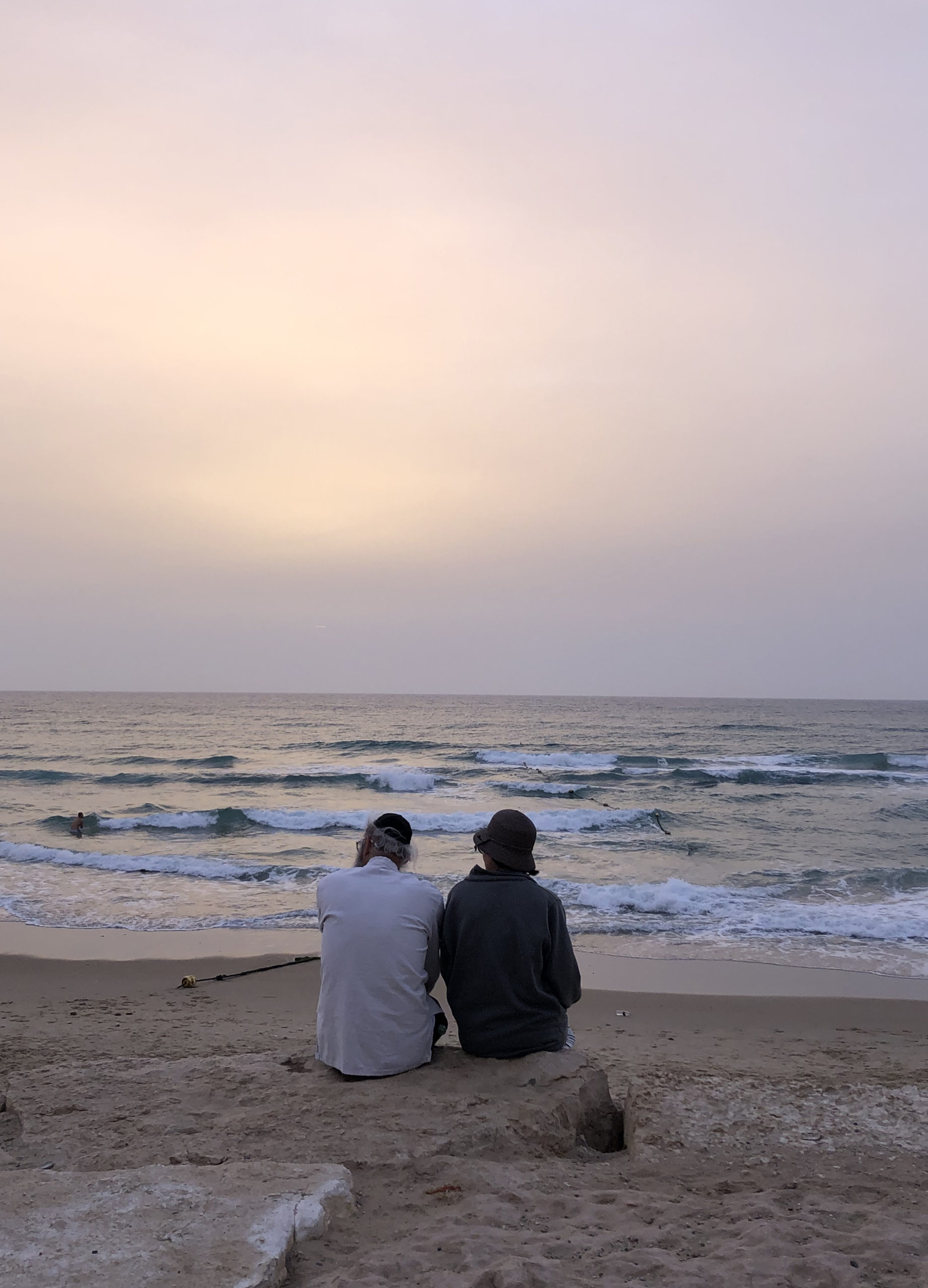
Couple enjoying the sea.
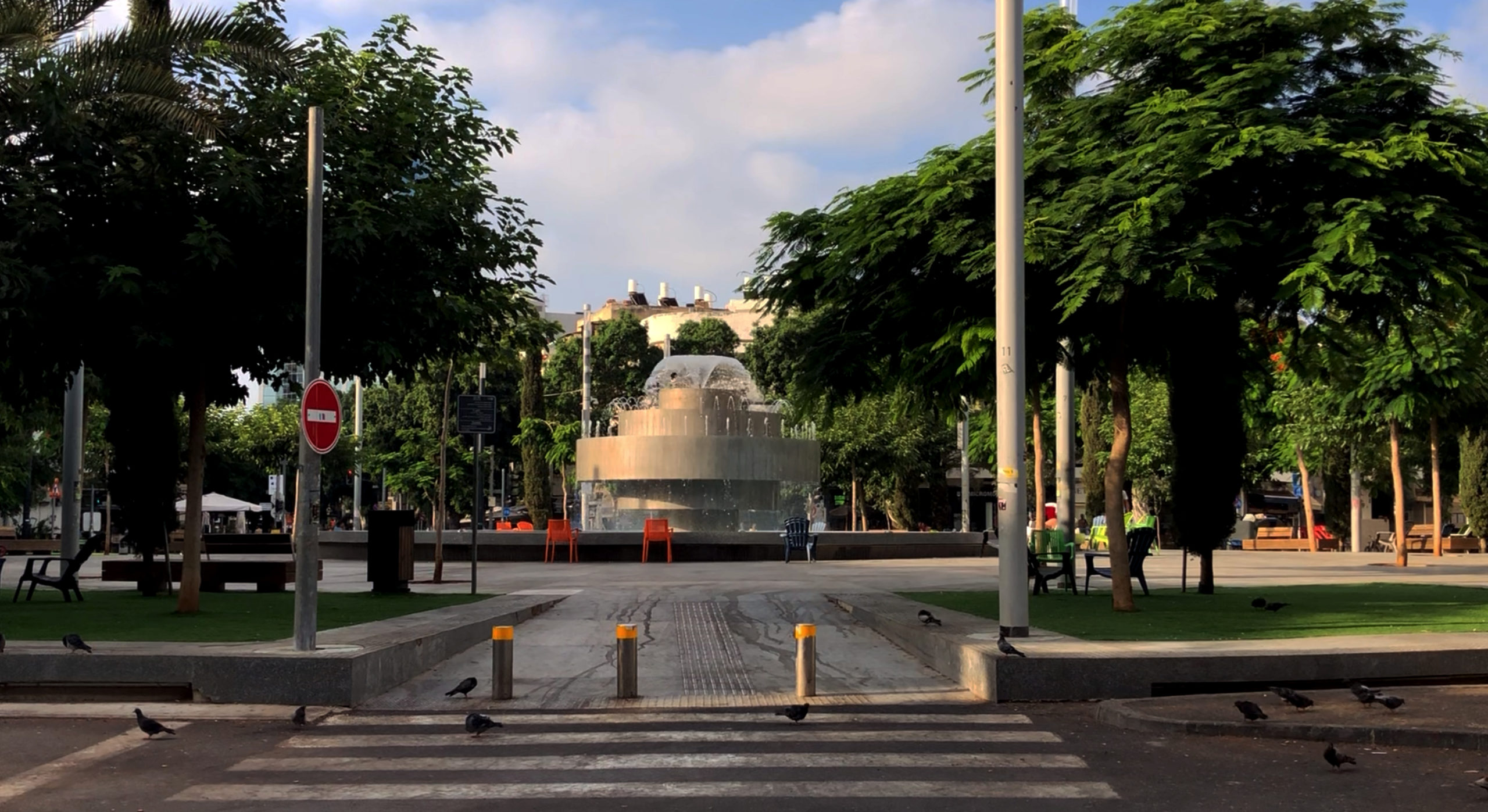
A square with a fountain. There was a fire inside the top of the fountain during the holiday. And that fire was covered with water, just on that one day.
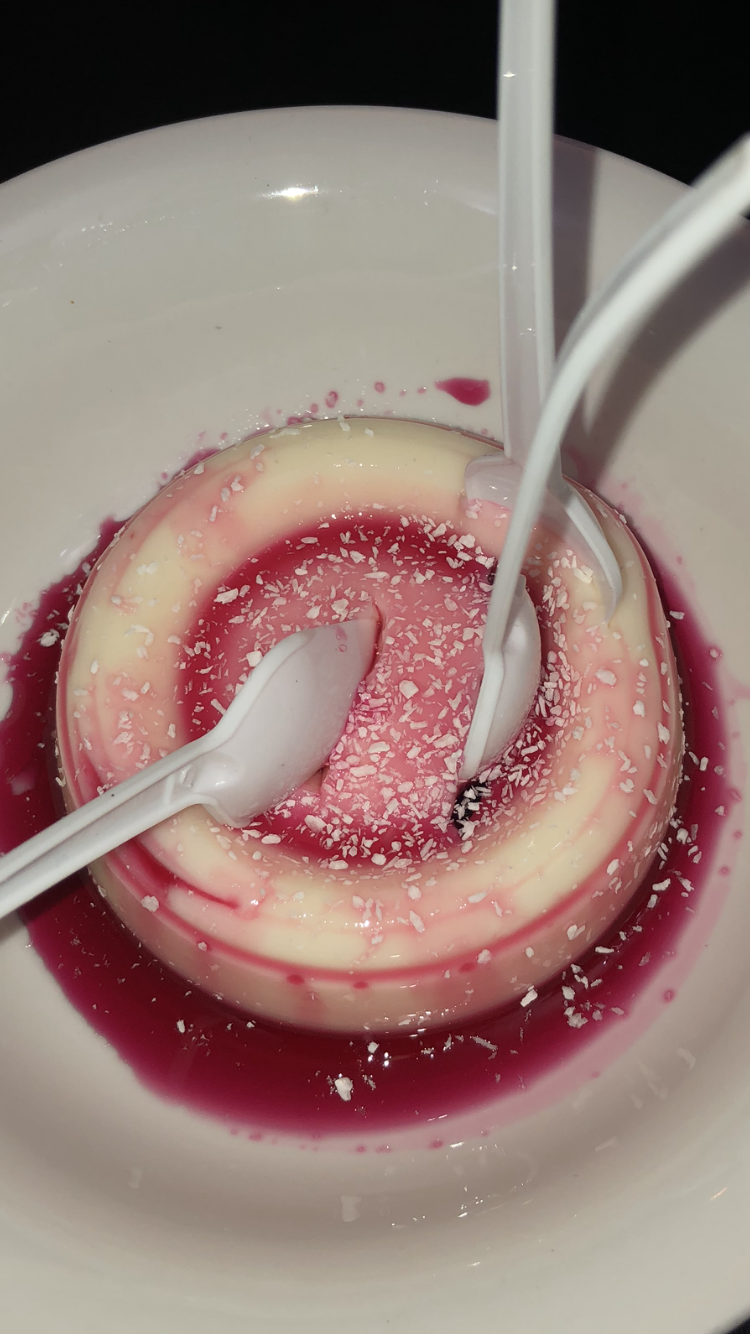
You can enjoy Kosher puding Malabi even at night. It’s popular, at least within Tel Aviv. Photo taken at 00:21. First you have a full bowl of hummus with vegetables, then falafel and you end it with this sweet dessert with mint tea. It tastes like pudding covered in syrup and sprinkled with coconut.
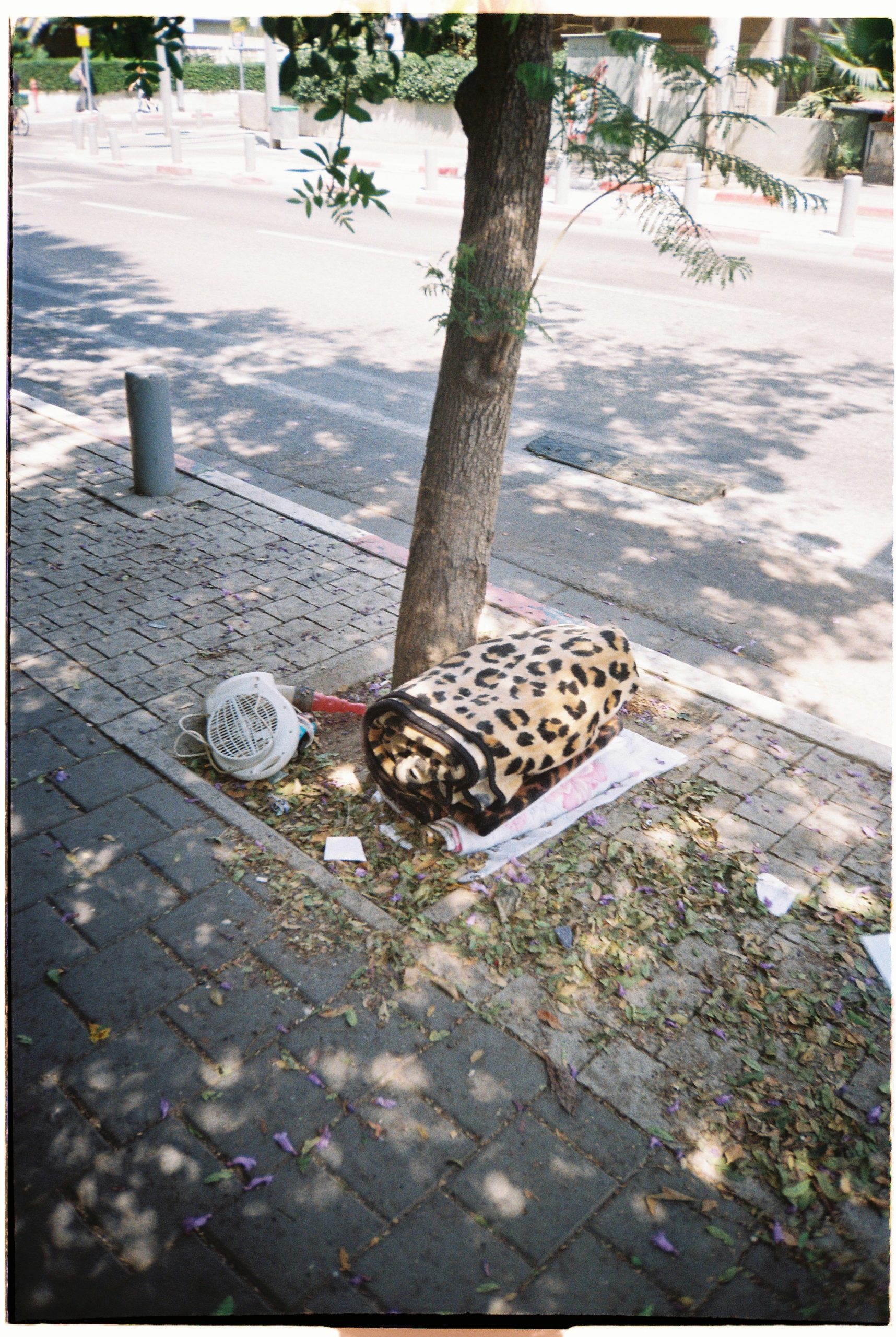
A numerous things on the street. I have several pieces of clothing from those benches.
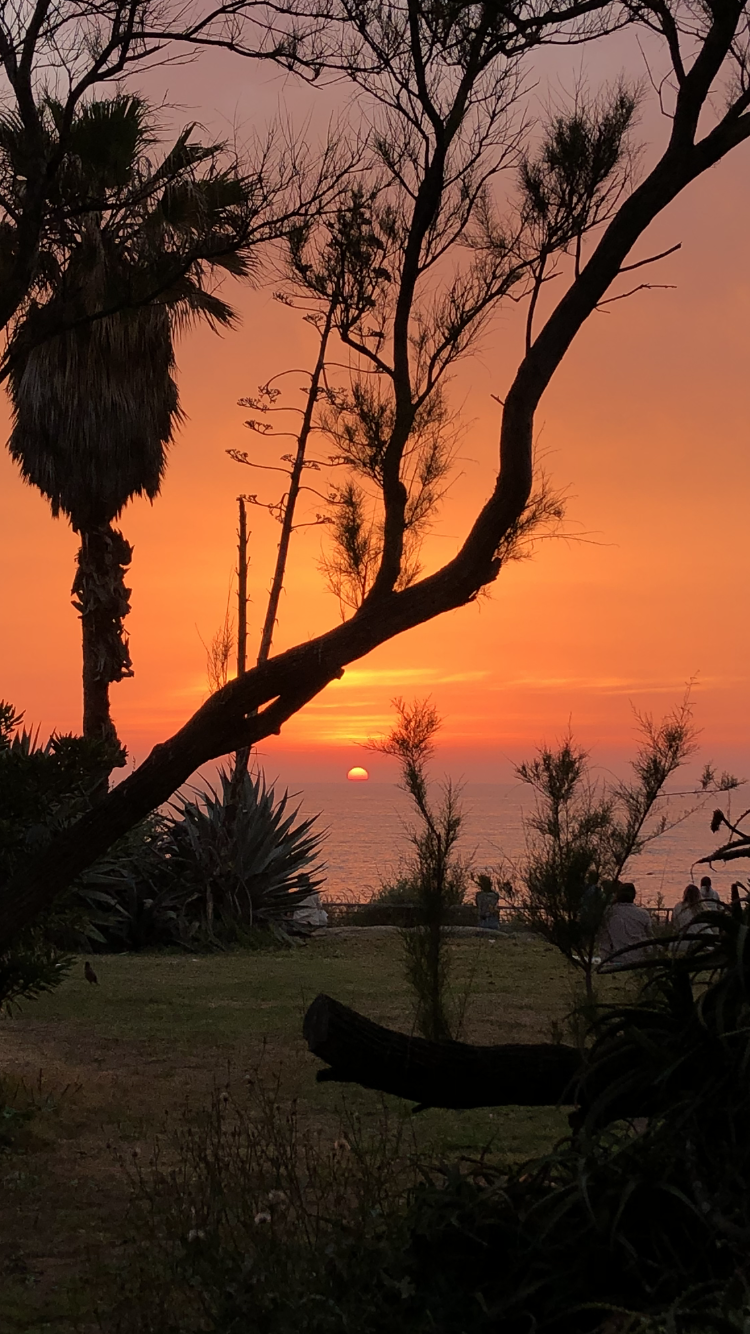
Daily sunset on the Hill. One can enjoy life, I can see it in the people – on Friday and Saturday, the city changes and you can absorb the peace from the air, everything slows down and walking on the pavement is easier, you just have to let yourself get carried away. If it would be possible to see the sea, every day at least for a few minutes, it swayed and caressed me there.
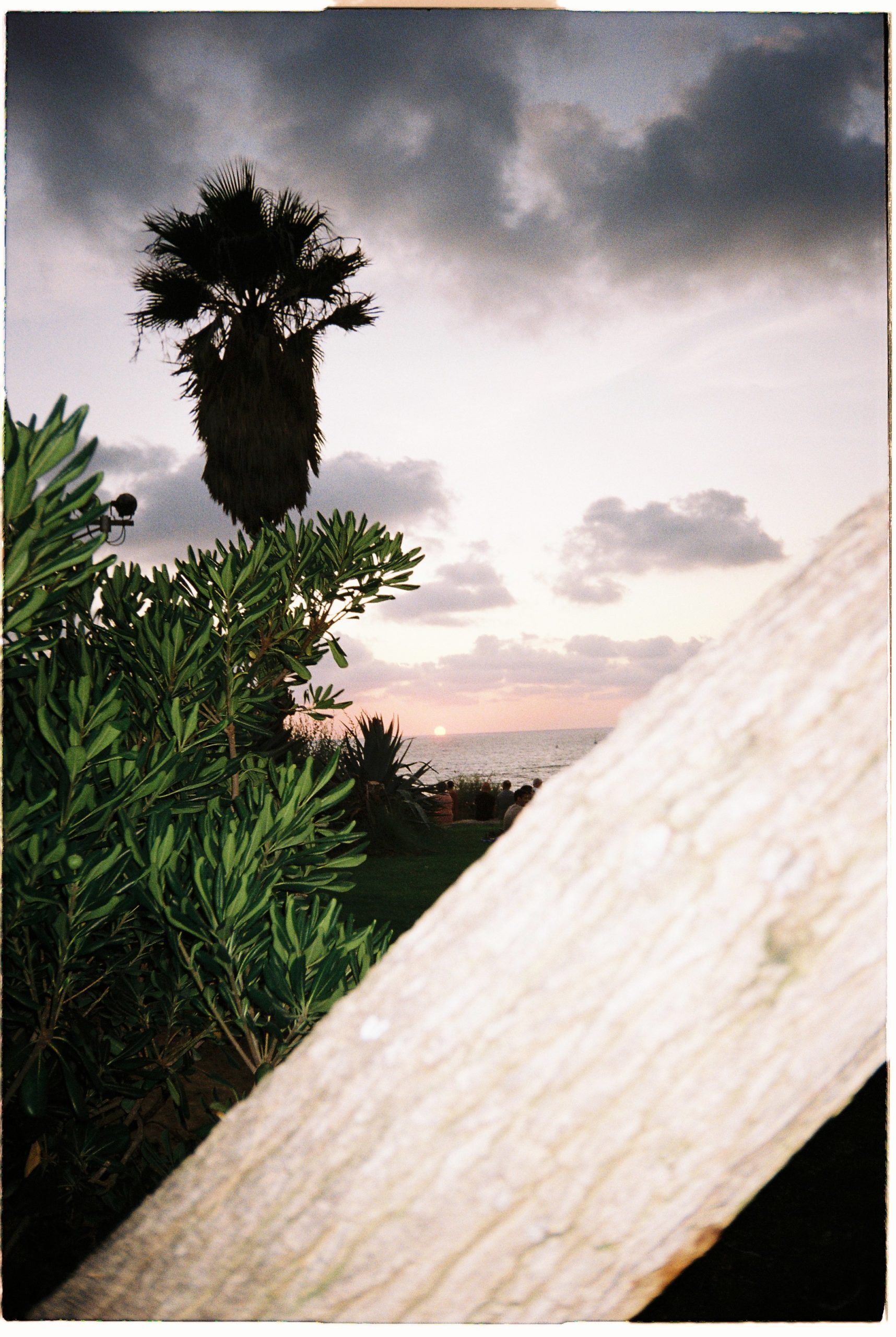
The last sunset on the Hill (my favorite spot in Tel Aviv).
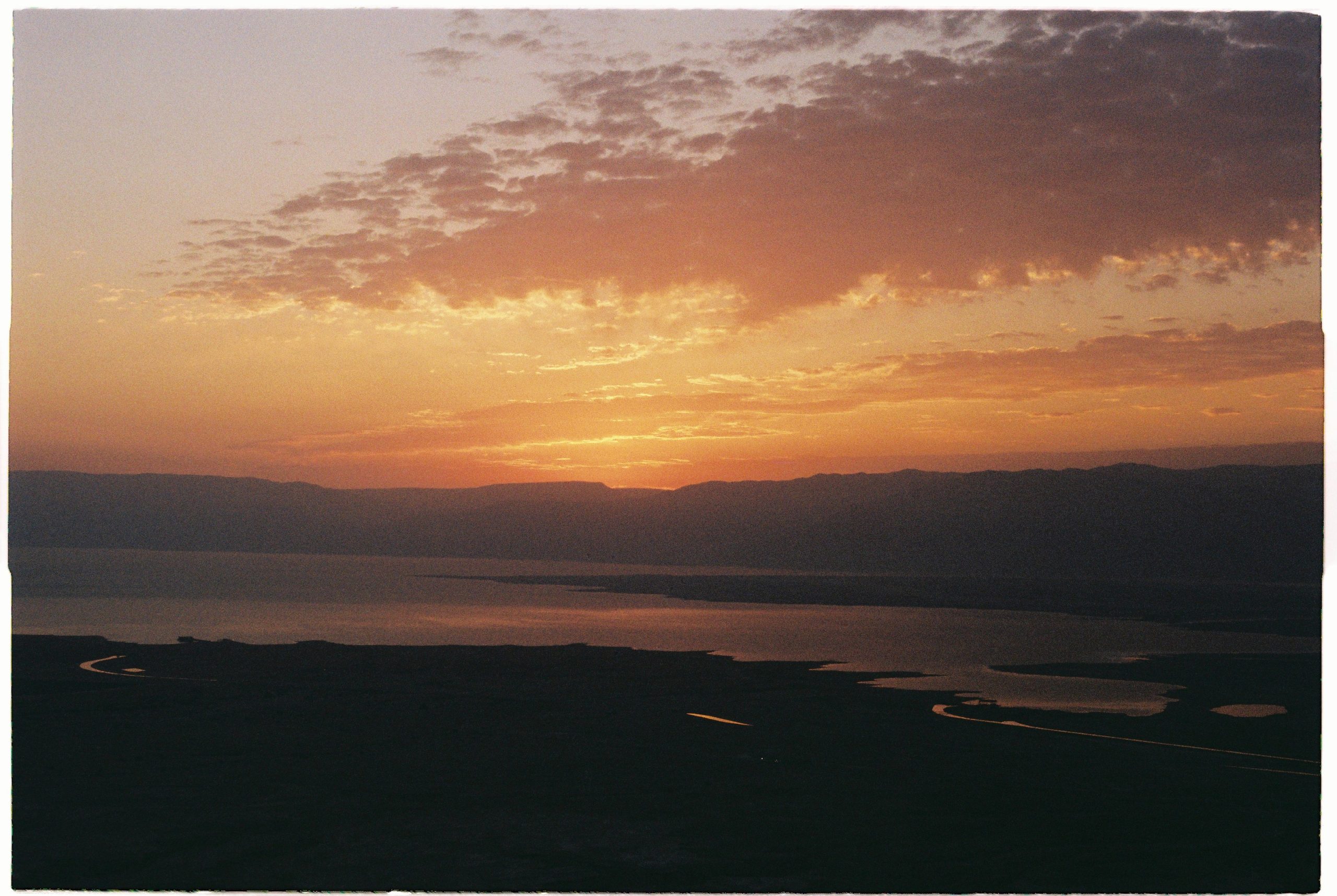
The sunrise at Masada.
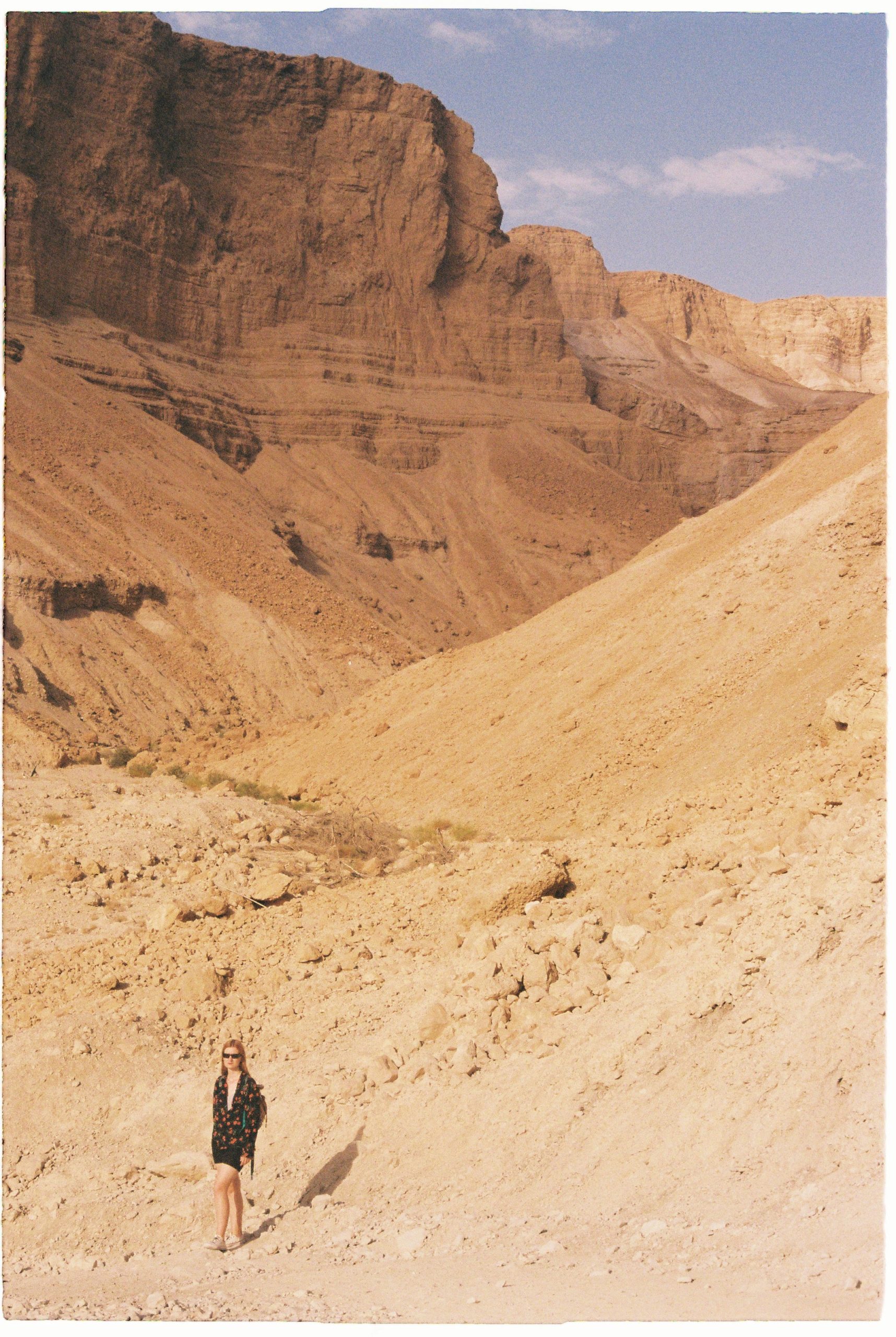
Me on the Masada.
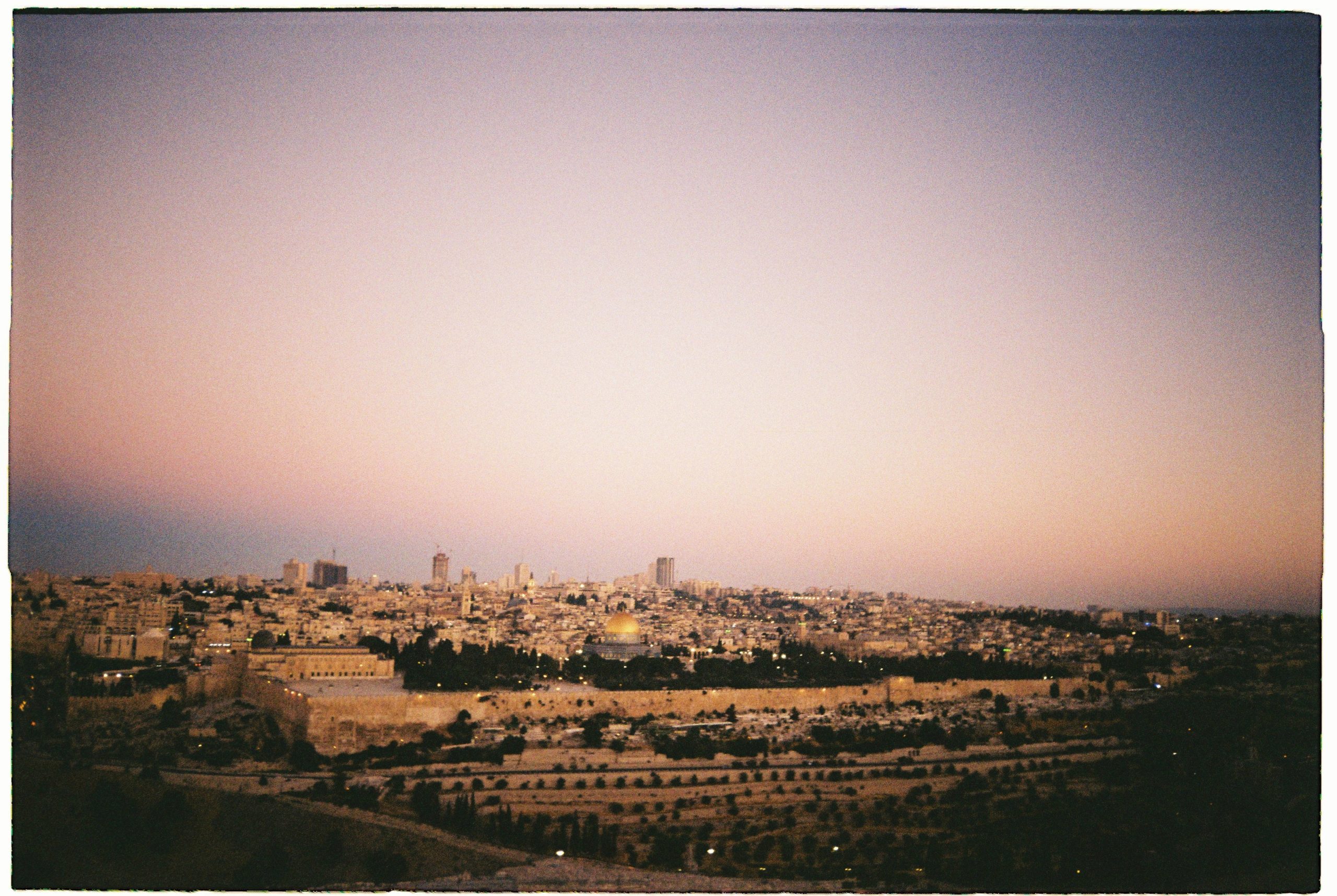
The Mount of Olives in Jerusalem. Waiting for the sunrise.
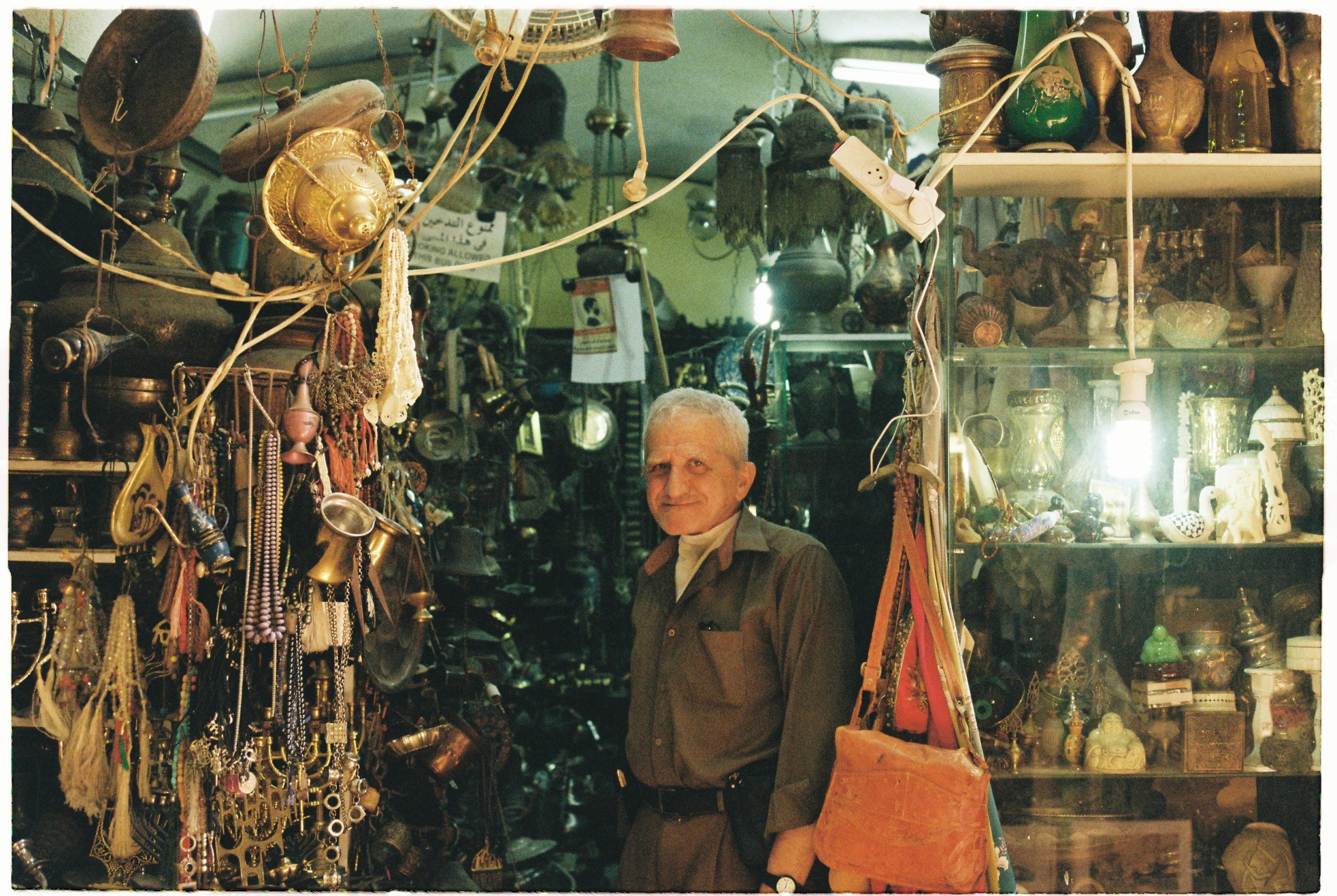
Incredibly nice merchant at the antique store in Jerusalem where I bought the Menorah.
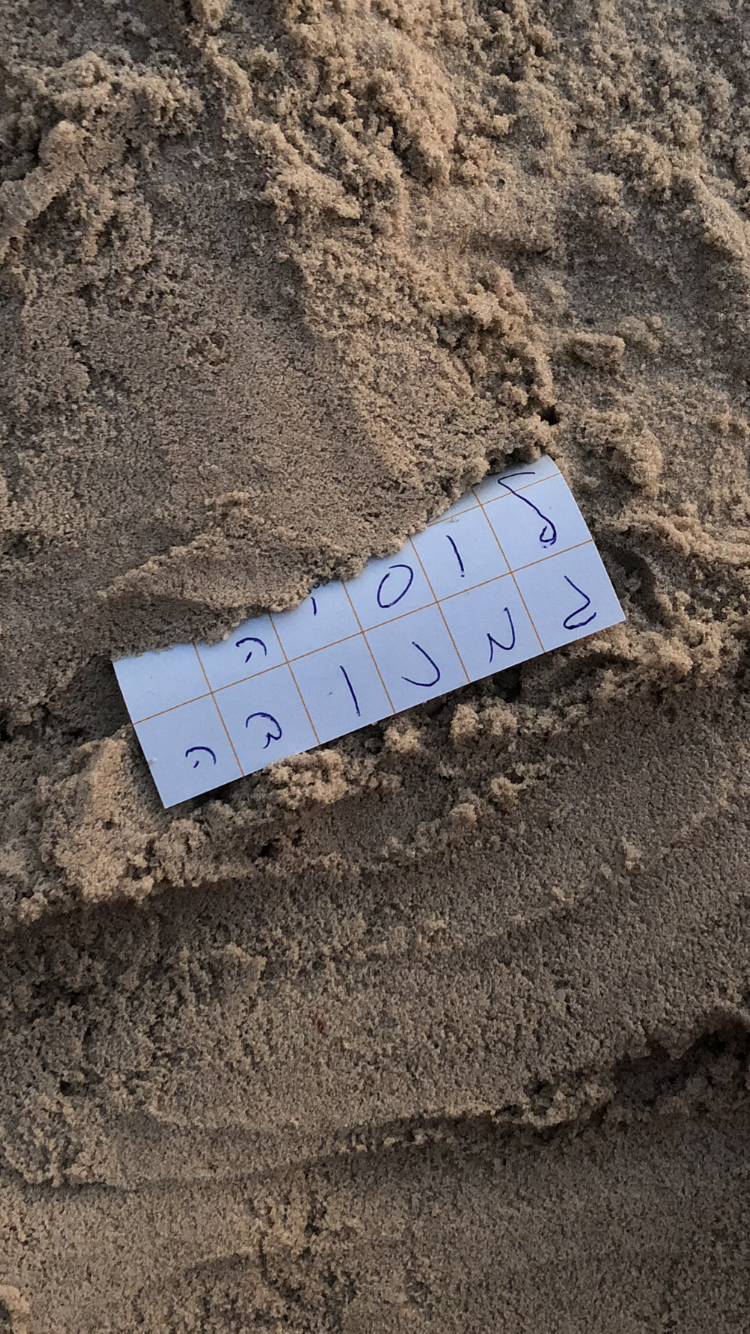
My name in Hebrew written by my friend Dror.
We have talked about your first month. We’ve spent about 6 hours talking together:)
That first month was the most important for me of all three. In the first month, I discovered new situations, completely new impulses. In May, the day was much longer for me. I experienced the most during May. Then I found my routine and system and felt at home.
I like when I’m somewhere in a new environment at the beginning, it’s a completely different sharpness of consciousness.
Yes, I watched my surroundings much more at the beginning. Then, I found my own ways and was not so aware of what was happening around me. Some moments were powerful. Certainly the sunsets that I experienced are comparable in intensity to the experience of the desert, where I saw the sunrise when my husband Matej came to see me. During the day it is terribly hot there, so we traveled there from Tel Aviv at 1am, and we arrived at Masada at 3:30am.
Sunrise
What is Masada?
Masada (Heb. מצאדה, Mecada, from the word מצודה mecuda, “fortress”) is an ancient fortress near the Dead Sea. The ascent to this fortress takes more than an hour. One of the strong moments was when we got there in the dark. The closer we got to the top, the brighter it became, slowly revealing the outlines of the desert. It could also be the mountains, it reminded me of the hills in The High Tatras. When we got up, the sun started to rise. It took a few minutes. The day had begun. The opposite of what I experienced in the city, in Tel Aviv I always went to see the sunsets, at Masada I saw the sunrise.
What feeling do you associate it with?
Realizing that sunrise is every day, but you rarely experience it, maybe only once a year.
I remember, when the sun was rising in the desert at that moment, one does not have time to fully reflect what is happening there. Suddenly you see the desert around. Surfaces, different surfaces of the earth, you are surrounded by a huge space, you see The Dead Sea, which belongs to two countries. You experience the dawning of the desert, the gradual realization of where you are and then the sunrise, the moment of the beginning of the day. You are so small in that space.
Shortly after the sun rose, there were too many degrees and we had to go back. We passed through The National Nature Reserve Ein Gedi. When you travel from one o’clock in the morning, you are already on a different line of the day. We entered the store, where a saleswoman greeted us with the greeting: Boker Tov (Good morning). I stopped and looked at the clock. It was half past eight. I already had completely different contexts behind me.
Good morning. What an ‘oh’ moment.
That was such a return to reality. Because both Masada and Ein Gedi were something unbelievable. And then you go down, into a small shop where you buy a popsicle and suddenly you find out that someone’s day has just started and you’ve already spent five hours in the desert, sunrise and a walk in the national park.
It’s like you’ve entered a time slot, a visor.
Exactly, and you can experience it every day, even though it probably wouldn’t be so special to anyone after that. I have never tried it in Bratislava. My first sunrise here was when I was coming back from Israel. Bratislava welcomed me with a sunrise. First, my flight was 6 hours late. I was very exhausted and when I was arriving to Bratislava, the sunrise brought me to tears. I told myself that it had to be like that, the sunrise was waiting for me.
I experienced one more special sunrise, on The Mount of Olives in Jerusalem. I went there with my friend Darjan. My plan was to show him Masada and watch the sunrise, but we didn’t manage it due to traffic. The bus went with a transfer through Jerusalem. The first morning transport went through The Western Wall, from there we walked for about half an hour to The Mount of Olives. On the bus, at every stop, there were more people entering, preparing for the first-morning prayer and gradually unfolding their prayer books. The bus was full and as if whispering. You couldn’t move there, it was about half past four in the morning, different age groups, from the smallest children to grandmothers and grandfathers, sitting or standing, holding their books and moving with their ritual movements, preparing for The Western Wall.
That was an encounter with authentic life in Jerusalem, the time locals used when there were no tourists. We became part of their journey. We were speechless, and we looked at each other across the whole bus. They were so immersed in prayer that I did not feel at all that we were taking away their space.And then, when you’re already standing on The Mount of Olives and it starts to dawn, you see how The Al-Aqsa Mosque starts to shine with incredible intensity, suddenly it becomes The Sun. It is the sun, itself.
Why do you think we don’t experience such everyday universal miracles as the sunrise even at home, but we have to go somewhere else?
I probably have it because when the environment is intimately familiar to me, I think I can experience it at any time. You have something so present that you can do it every day, so you perceive it as something you don’t need to do now, because you can do it anytime. It might not even occur to you. When I returned, I searched for the most beautiful sunsets and sunrises around Bratislava. I had an ambition to go to see some sunrise, but so far I haven’t.
Exactly, how to bring that experience home and apply it. I’m learning it, too.
That’s exactly what I told myself, when I get back, I’ll find places to walk… Do it like this. I will explore the environment, which I know through the eyes of the person who sees it for the first time. Walking the streets as if I didn’t know them. To experience it all over again… It would be great if we would go on a hike like that.
You know what, we could go to the Carpathians together.
We could. But really!